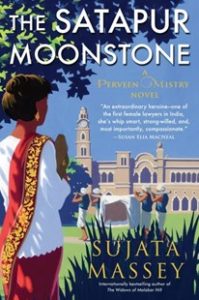It is somewhat late for this but here are my best (and some worst) books for 2020.
Best Literary novel
 Drive Your Plow Over the Bones of the Dead by Olga Tokarczuk
Drive Your Plow Over the Bones of the Dead by Olga Tokarczuk
I find it hard to pinpoint just what I loved about this short novel by the Polish Nobel laureate. Please don’t be put off by the title, it’s not about the holocaust, or massacres, unless you think we humans’ treatment of animals is something like that. It is not a grand book, it has a small canvas – an out of the way hamlet in rural Poland. The novel does have one of my pet loves, that is, a tough older woman taking on the (small) world. It is ostensibly a murder mystery as Janina’s neighbours start turning up dead. Janina takes it into her own head to find out what’s going on, amidst the snow and harsh conditions. Yeah, I can’t explain why I loved it but I just did.
Honourable mentions to The Inheritance of Loss by Kiren Desai, Madeline Miller’s wonderful Circe, Wolfe Island, as below, and My Dark Vanessa by Kate Elizabeth Russell which is an interesting and brave take on complicity and abuse in a sexual relationship between a male teacher and female student.
Best Fantasy or speculative
 A good year for this. I particularly enjoyed The Priory of the Orange Tree by Samantha Shannon as well as Skyward by Brandon Sanderson. I’ve never felt like reading his adult books but this children’s/YA one of a young aspiring female pilot, carrying the burden of her father’s cowardice in battle, and her talking ‘ship’, was well-written and absorbing.
A good year for this. I particularly enjoyed The Priory of the Orange Tree by Samantha Shannon as well as Skyward by Brandon Sanderson. I’ve never felt like reading his adult books but this children’s/YA one of a young aspiring female pilot, carrying the burden of her father’s cowardice in battle, and her talking ‘ship’, was well-written and absorbing.
I am an avid fan of Garth Nix and am currently rereading his ‘Abhorsen’ books (sigh, cry etc. etc.). His latest The Left-Handed Booksellers of London is a gem – set in the 80s, there is some great nostalgia for us who lived through it as young adults, plus the usual fantastic characters and dark plot.
Best book with a tough woman protagonist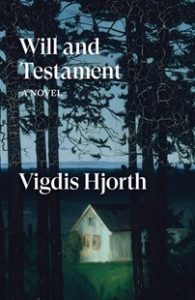
This is my find for 2020 – tough, older women not taking it anymore. As well as Olga Tokarscuk, there’s Norwegian writer Vigdis Hjorth who turns her gimlet eye on siblings and inheritance in Will and Testament and guilt, solitude, selfishness and art in A House in Norway. US writer Ottessa Moshfegh adopts a similar delicious tone in Death in Her Hands. It’s not everyone’s cup of tea but I just love it.
Best audiobook
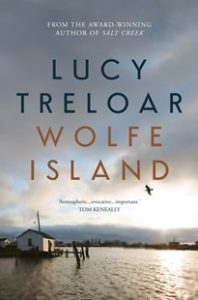 A good book can be ruined by the wrong narrator/performer but the right one can bring so much out in a book I otherwise might not have read. Abbe Holmes’ southern drawl in Wolfe Island gave resonance to the protagonist, the wonderful dry, tough, Kitty Hawke, I loved it. The crisp British tones of Sophie Aldred makes her one of my favourite narrators and she didn’t disappoint in Skyward. I don’t know if I would have picked up the paper version of Bernadine Evaristo’s Girl, Woman, Other, but having it narrated to be by Anna-Maria Nabirye made it a pleasure. Jenny Agata couldn’t have been more perfect for Jessica Mitford’s Hons and Rebels.
A good book can be ruined by the wrong narrator/performer but the right one can bring so much out in a book I otherwise might not have read. Abbe Holmes’ southern drawl in Wolfe Island gave resonance to the protagonist, the wonderful dry, tough, Kitty Hawke, I loved it. The crisp British tones of Sophie Aldred makes her one of my favourite narrators and she didn’t disappoint in Skyward. I don’t know if I would have picked up the paper version of Bernadine Evaristo’s Girl, Woman, Other, but having it narrated to be by Anna-Maria Nabirye made it a pleasure. Jenny Agata couldn’t have been more perfect for Jessica Mitford’s Hons and Rebels.
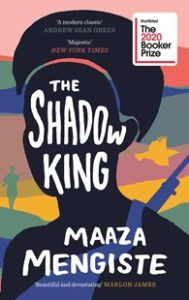 Book that doesn’t deserve the hype
Book that doesn’t deserve the hype
The Shadow King by Maaza Mengiste
I guess you can’t get more hyped than being short-listed for the Booker prize (besides winning it). The Shadow King certainly garnered a lot of accolades with reveiwers often viewing it as affirmation of women as the author references in an afterword, her great-grandmother who fought against the invasion of Ethiopia by the Italian fascists. However, if the novel is supposed to be ‘an exploration of female power, it’s a depressing portrayal. Rather than being about the rewards of rebellion, the competency of women fighting alongside men, it is more about the ‘fog of war’, its ugliness, the viciousness of fascism, and who suffers the most – the poor, the third world, the women. We see women (and the protagonist, Hirut, in particular) used, abused, raped, taken for granted and dismissed.
I found the novel to be so overwritten, so consciously oblique, that for much of its length I had a hard time working out what was actually happening. For its popularity, I can only conclude that many people have read into this book what they want it to say. Its elusiveness and opacity allow for this.
Most objectionable book
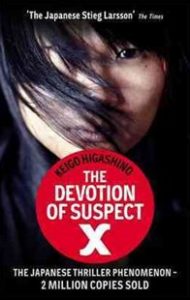 The Devotion of Suspect X by Keigo Higashino
The Devotion of Suspect X by Keigo Higashino
I didn’t like the treatment of women in this. It’s a long dry, cerebral work. No one seems to care what happens to Yasuko, the main female character who is in fear of her ex-husband, or about her fourteen-year-old daughter. We are supposed to care about the fate of Yasuko’s next-door neighbour (male) who helps her out. As long as the detective (male) and his mathematics professor sidekick (male) resolve the fiendishly clever ‘problem’, that’s all that matters. For crime to be satisfying, it’s not just about puzzle-solving, it’s about justice, and I don’t mean merely in the legal sense.
Guilty comfort reads
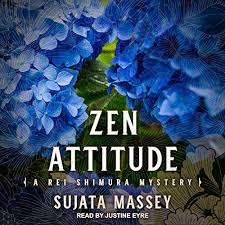 I loved Sujata Massey’s recent crime novels set in 1920s India – The Widows of Malabar Hill and The Satapur Moonstone so I sought out her backlist of crime novels of 1980s Japan. Rei Shamura is half-Japanese half-American and trying to start up a business as an antiques consultant in Tokyo. Although they are light crime investigations with an edge of romance, Massey is more serious about exploring aspects of Japanese life and culture from an outsider’s perspective (Rei is never allowed to forget she’s not a proper Japanese). They are a lot of fun and cover aspects such as Buddhism, the history of kimono, flowering arranging etc.
I loved Sujata Massey’s recent crime novels set in 1920s India – The Widows of Malabar Hill and The Satapur Moonstone so I sought out her backlist of crime novels of 1980s Japan. Rei Shamura is half-Japanese half-American and trying to start up a business as an antiques consultant in Tokyo. Although they are light crime investigations with an edge of romance, Massey is more serious about exploring aspects of Japanese life and culture from an outsider’s perspective (Rei is never allowed to forget she’s not a proper Japanese). They are a lot of fun and cover aspects such as Buddhism, the history of kimono, flowering arranging etc.
Best Australian books
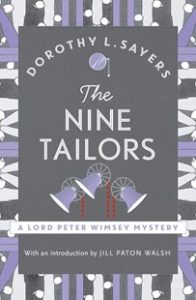 Wolfe Island and Heather Rose’s Bruny. It might be far-fetched in places, but she goes right in there with her take on corruption and politics in the Apple Isle, and a prodigal daughter with secrets of her own – a lot of fun.
Wolfe Island and Heather Rose’s Bruny. It might be far-fetched in places, but she goes right in there with her take on corruption and politics in the Apple Isle, and a prodigal daughter with secrets of her own – a lot of fun.
Best crime
Not a great year for this but I enjoyed, admired and respected Dorothy L Sayers’ Nine Tailors. On a lesser plane, but nevertheless enjoyable was Lucy Atkins’ Oxford-set Magpie Lane. Anthony Horowitz’s Moonflowers Murders was devilishly clever with a full crime novel contained within the crime novel. I take my hat off to him.



